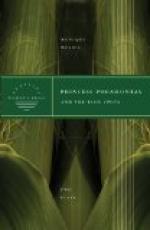Pocahontas laughed.
“That is no punishment. ’Tis a strange thing, but when I do things I like not for those I love, why, then I pleasure in doing them. I will fashion for thee such a robe as thou hast never seen. Oh! I know how beautiful it will be. I will make new patterns such as no squaw hath ever dreamed of before. But thou wilt never be really angry with me. Father, wilt thou?” she questioned pleadingly. “And if I should at any time do what displeaseth thee, and thou wearest this robe I make thee, then let it be a token between us and when I touch it thou wilt forgive me and grant what I ask of thee?”
And Powhatan promised and smiled on her before he set forth for the guest lodge.
[Illustration: Decorative]
CHAPTER II
POCAHONTAS AND THE MEDICINE MAN
Some months later on there came a hot day such as sometimes appears in the early spring. The sun shone with almost as much power as if the corn were high above the ground in which it had only just been planted with song and the observance of ancient sacred rites and dances. Little leaves glistened like fish scales, as they gently unfurled themselves on the walnut and persimmon trees about Werowocomoco, and in the forest the ground was covered with flowers. The children tied them together and tossed them as balls to and fro or wound them into chaplets for their hair; the old squaws searched among them for certain roots and leaves for dyes to stain the grass cloth they spun, called pemmenaw.
The boys played hunters, pretending their dogs were wild beasts, but the bears and wolves did not always understand the parts assigned them and frolicked and leaped up in delight upon their little masters instead of turning upon them ferociously. The elder braves lay before their lodges, many of them idling in the sunshine, others busied themselves making arrows, fitting handles to stone knives or knotting crab nets. Two slaves, brought home prisoners by a war party, were hollowing out a dugout, which the Powhatans used instead of the birchbark canoes preferred by other tribes. They had cut down an oak tree that, judging from its rings, must have been an acorn when Powhatan was a papoose, seventy years before. They had burned out a portion of the outer and inner bark and were now hacking at the heart of the wood with sharp obsidian axes.
The squaws were also all busy out of doors, though they chatted in groups as eagerly as if their energy were being expended by their tongues only. Many were at work scraping deerskin to soften it before they cut it into robes for themselves or into moccasins for the men. Here and there little puffs of smoke that seemed to come from beneath the earth testified to the dinners that were being cooked under heated stones.




